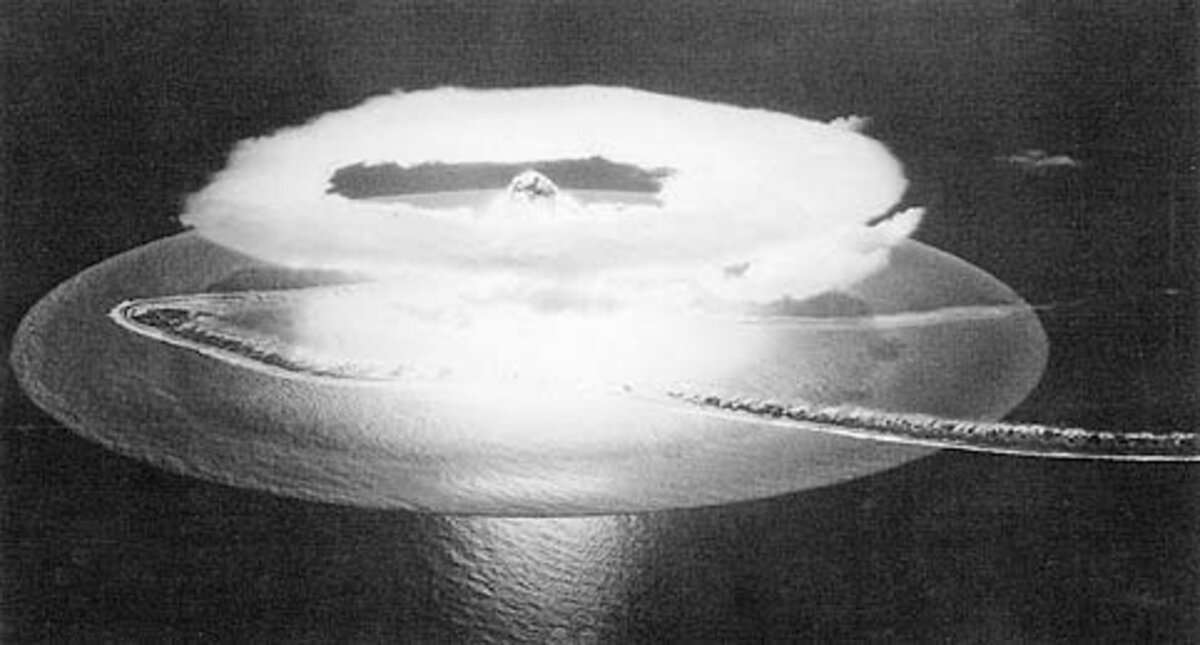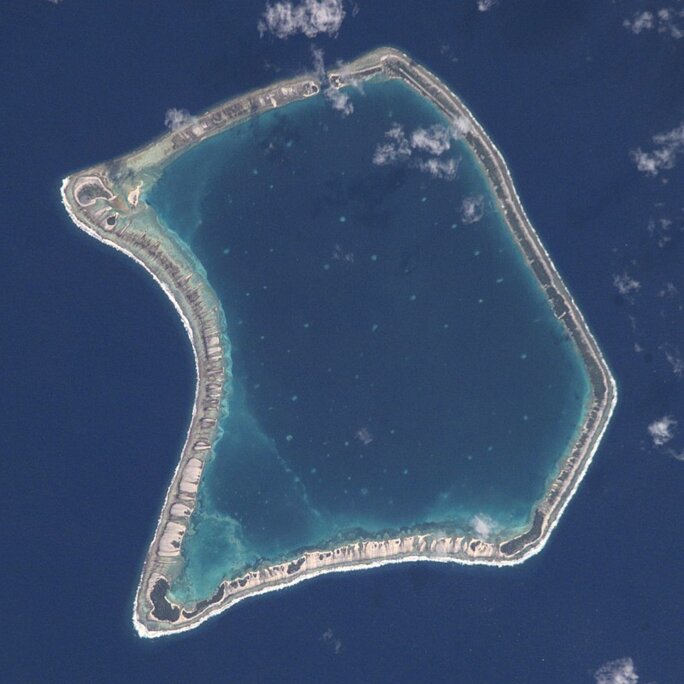The lower and upper houses of the French parliament this week adopted a reform of the organic law defining the new semi-autonomous status of French Polynesia, a territory of archipelagos and atolls in the mid-South Pacific Ocean, and in the process recognised in a formal text for the very first time the highly sensitive issue of the human and environmental consequences of three decades of France’s nuclear bomb tests there, 23 years after the last of the explosions was triggered.
“The [French] Republic recognises the contribution put upon French Polynesia for the construction of the Nation’s nuclear dissuasion capacity and defence,” reads Article 1 of the text adopted on May 23rd, and which also refers to the “conditions for indemnities of persons suffering from radiation-induced illnesses”. It engages France to assist with “the economic and structural reconversion of French Polynesia consecutive to the cessation of nuclear tests”.

The text is the fruit of a semantic compromise obtained after a hard-fought campaign by Polynesian Members of Parliament (MPs), when the French government and MPs from its parliamentary majority attempted up until the last minute to dilute the clarity of the statement. Over a long period during the discussions, it was envisaged that only the word “contribution” would be used to describe French Polynesia’s part in the testing, instead of the final wording that states this was a contribution it was “put upon” to make.
“We managed to have ‘contribution put upon’ inscribed because it was necessary at all costs to avoid giving the impression of a voluntary act by our country,” said Moetaï Brotherson, an MP for the pro-Polynesian independence party, Tavini Huiraatira No Te Ao Maohi.
Brotherson, who also sits in Polynesia’s local Assembly, played an active role in the debates in the French parliament, where a joint cross-party committee finalised the fine wording of the organic law which gives the territory – made up of 118 islands, spread among vast and distanced archipelagos such as the Marquesas, the Windwards and the Australs – a large amount of autonomy to its own local government.
The mention of what might be called a nuclear ‘debt’ in a law defining the future relationship between France and Polynesia emerges from a progressive recognition in France of the dramatic consequences of the 193 nuclear tests carried out in the South Pacific between 1966-1996. These were the equivalent of “700 times Hiroshima”, underlined Polynesian centre-right MP Maïna Sage speaking in the French parliament in July 2016, when she addressed then-French Prime Minister Manuel Valls over the delays in compensation for victims of the radiation.
The reform of the organic law is supposed, at least in part, to recognise the awesome magnitude of the tests, which were carried out underground, on the ocean and in the open air. By the close to unanimous vote in favour of the reform in the French Parliament, and with the support leant to it by the Polynesian local government, that aim appears to have been met. In numerous speeches, members of both the lower house (National Assembly) and the Upper House (the Senate), from almost all political parties, applauded the reform.
“We are the guarantors of the will of the [French] Republic to inscribe in stone the acts of reparations,” commented MP Maïna Sage, who was closely involved in the final drafting of the law, speaking in an interview with Mediapart in April. “It represents an important advance, the sign that mentalities are evolving at the highest level of the state. The rhythm of the indemnities has vastly accelerated over the past year, and we are making progress on the memorial issue given that the state has just transferred to us, for a symbolic 1 euro, the Hotel de la Marine in order to establish a memorial centre there.”
But pro-independence MP Moetaï Brotherson was critical of the new legislation, and explained before the final vote why he would oppose it. “Will this reform improve the lives of victims of the nuclear tests? No,” he said. “Does this text have a normative effect? Even [the highest French court for administrative justice] the Council of State, in the advice it gave on the subject, replied no. On the contrary, for me it is about a means for France to get away lightly and at little cost. To my knowledge, the French state has never asked for pardon and never will. This reform also doesn’t take into account the fact that French Polynesia, like New Caledonia, has been inscribed in the UN list of countries to be de-colonised.”
That clear-cut opinion is shared by some among the small circle of specialists on the issue of the tests in Polynesia. “I have an ambiguous sentiment regarding this tardy and symbolic recognition,” commented Patrice Bouveret of the independent French association l'Observatoire des armements (weapons observatory) which has published numerous reports on the consequences of French nuclear tests in the South Pacific. “What does the state concretely put in place for reparations? As with the Égalité réelle legislation [for greater economic and social justice for French overseas territories, adopted in 2017], the law recognises [a moral responsibility] in order, in reality, to minimise and to not deal with the consequences in their substance; the health impacts, but also those that are environmental and cultural. This is not only a financial issue, far from it.”
Between 2010-2018, just 11% of applications made before the public body responsible for deciding compensation awards, the Committee for Compensation of Victims of Nuclear Tests (CIVEN), which concerns those in French Polynesia and in the Sahara desert region of Algeria, were successful. Since recent reforms of the terms and criteria employed by the body, aimed at facilitating compensation awards, including the removal of the notion of “negligible risk” that was behind the refusal of many cases and which caused outrage among victims, 80 applications by Polynesian residents have been studied between January 2018 and March 2019, of which around half received the CIVEN’s approval for compensation. “If there is not a change in the method, another 15 years will be needed before all the cases are dealt with,” deplored socialist Senator Jean-Pierre Sueur. “That cannot be satisfactory.”
Last Tuesday, just two days before the adoption of the reform of the organic law, an administrative tribunal in Papeete announced its ruling on appeal of 12 applications for compensation for radiation contamination which had been rejected by the CIVEN, when it dismissed ten of the cases. The tribunal refused the ten applications on the grounds of an amendment to the law, introduced last December, which stipulates that an applicant must prove they were exposed to at least 1 millisievert of radiation per year. As a consequence of the amendment, many applications for compensation already filed are likely to be thrown out, or delayed by legal challenges.
“Many have departed [died] and there is now an inter-generational change in the population of the victims,” said Patrice Bouveret. “The witnesses and whistleblowers have disappeared and, despite the good intentions of the CIVEN, there are still many issues that are not looked into, like the transmission of illnesses between generations. No serious study has been made on the subject.”

Enlargement : Illustration 2

The creation of a memorial centre in Papeete constitutes the next step in the battle between the victims and their families and those who still see the cause of France’s nuclear dissuasion capacity as a just imperative. In French Polynesia attitudes have evolved over the years alongside recurrent reports on the fallout of the tests, notably by the local Assembly (parliamant) in Papeete, to the point where today there is a broad realisation of the health and environmental consequences of the three decades of nuclear explosions. But despite that, it remains a highly sensitive issue, and some recorded information, in particular about the damage caused to the environment, remains classified under French defence secrecy laws.
In Article 1 of the new reform of the organic law, it is noted that, “The [French] State ensures the maintenance and surveillance of the concerned sites on the atolls of Mururoa and Fangataufa”. That in effect continues to block outside access to these sites where, for many years, Polynesian campaigners and numerous international experts have requested access to, in vain.
-------------------------
- The French version of this article can be found here.
English version by Graham Tearse


